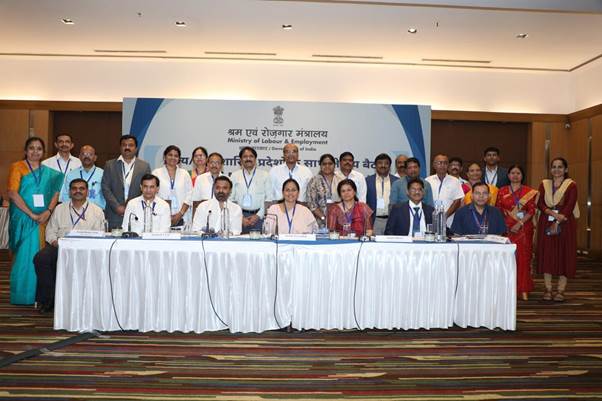Union Minister Sushri Shobha Karandlaje Chairs Regional Meeting on Boosting Employment Generation and Labour Reforms
Union Minister Sushri Shobha Karandlaje Chairs Regional Meeting on Boosting Employment Generation and Labour Reforms
Union Minister of State for Labour & Employment, Sushri Shobha Karandlaje chaired a crucial regional meeting with six States/UTs — Karnataka, Tamil Nadu, Telangana, Kerala, Puducherry, and Andaman & Nicobar Islands — in Bengaluru today. Shri Santosh Lad, Minister of Labour for the State of Karnataka, was also present at the meeting. This marks the first in a series of six regional meetings planned by the Ministry of Labour and Employment with all States/UTs, emphasizing the spirit of Cooperative Federalism.
The meeting focused on discussions around labour reforms, the eShram Portal, Building & Other Construction Workers (BoCW), and boosting employment generation, reflecting the Government’s commitment to inclusive development and welfare of all sections of the workforce.

In her address, Sushri Shobha Karandlaje, emphasised the critical role States must play in the successful implementation of the Labour reforms. Today’s meeting was held with the objective to interact closely with States, identify gaps, address concerns and draw up the way forward in a collaborative manner, she added. She encouraged all participating States to align their steps with other States and with the overall vision laid out by the Central Government. Underscoring the fact that labour is engaged in States, she highlighted the role of States in ensuring welfare of the unorganised workers and motivated State officials to utilise various mechanisms created by the Ministry, including e-Shram.
Shri Santosh Lad highlighted the State’s commitment towards labour welfare and assured that the development of the State-specific rules would be done in a time-bound and holistic manner.
Ms. Sumita Dawra, Secretary, Ministry of Labour and Employment, while setting the context for the meeting, highlighted the need for adopting a ‘whole of Government’ approach in reforming the labour sector. She highlighted that States need to harmonize State-specific rules with Central Labour Codes to ensure uniformity and ease of compliance across the country, and that this needs to be done in consultation with industry, trade unions and other stakeholders.
Showcasing the benefits of establishing e-Shram portal as One-Stop-Solution for unorganised workers, she requested the States to take a proactive stance in the much-needed two-way integration process, to achieve the objective of welfare of unorganised workers through easy access to social security and welfare measures. Emphasising the importance of creating quality jobs and accurate measurement of employment, she mentioned that Ministry will come out with a scientific framework for capturing State-level employment generation initiatives and outcomes.
During the meeting, the expectations from States/ UTs were highlighted, which are as follows:
Key points for BoCW included expanding welfare coverage, ensuring audits, and integrating data with eShram to enhance registration and extend the coverage of Central Welfare schemes like PMJJBY/PMSBY/PMJAY/PMSYM to BOC workers. States/UTs were encouraged to increase cess collection and compliance with model welfare schemes.
On employment generation, modernization of Employment Exchanges, building partnerships with educational institutions, and industry collaboration were discussed. Improving ESIC services through optimal infrastructure utilization, forming State ESIC Societies, and streamlining fund flow was also emphasized.
Extensive interactive sessions were held between officers from the States/UTs and the Government of India on each issue. State/UT concerns were discussed, queries were addressed, and suggestions for future actions were noted. Best practices from various States were also shared.
Mr. Kamal Kishore Soan, Additional Secretary, Ministry of Labour and Employment, thanked State/UT officials for their participation and urged continued cooperation in implementing labour reform initiatives. He assured them of full support from the Government of India for these efforts.
- Timely and regular submission of employment returns and job-fair details to DGE through the modules on the NCS portal.
- Time-bound two-way integration with the e-Shram portal;
- Employment data creation and adoption of a focused approach for creating quality jobs;
- Adopt a consultative approach to framing State rules.